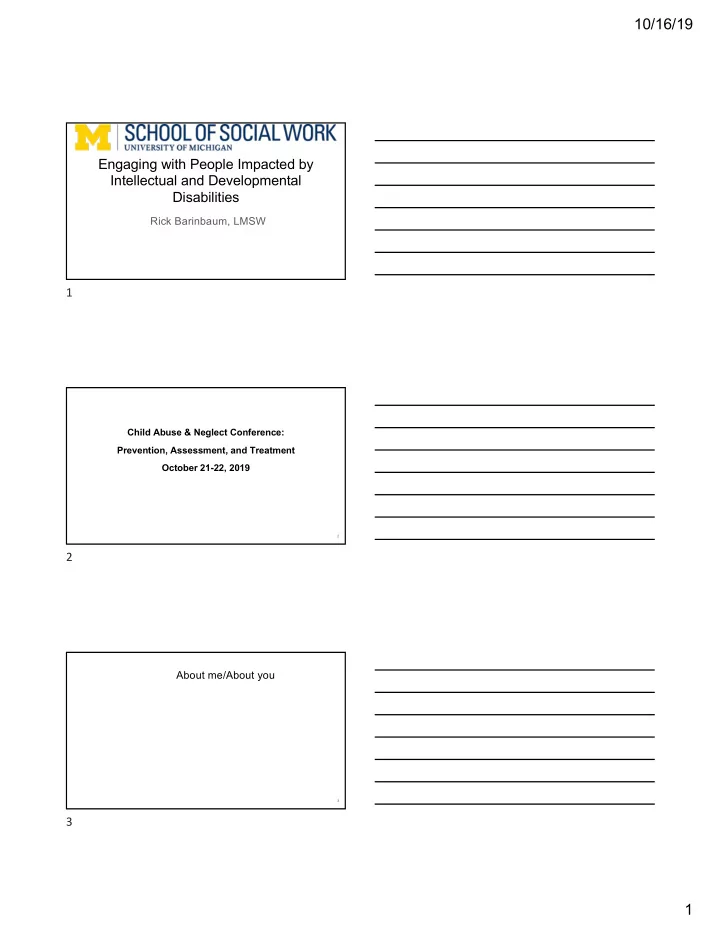

10/16/19 Engaging with People Impacted by Intellectual and Developmental Disabilities Rick Barinbaum, LMSW 1 Child Abuse & Neglect Conference: Prevention, Assessment, and Treatment October 21-22, 2019 2 2 About me/About you 3 3 1
10/16/19 Today’s Purpose What we will discuss What we won’t discuss 4 4 What is I/DD? Impairments of mental ability or adaptive functioning in three areas: ● Conceptual Domain ● Social Domain ● Practical Domain 5 5 The Conceptual Domain ● Language ● Reading ● Writing ● Math ● Reasoning ● Knowledge 6 ● Memory 6 2
10/16/19 The Social Domain ● Empathy ● Social judgment ● Interpersonal communication skills ● The ability to make and retain friendships 7 7 The Practical Domain ● Personal care ● Job responsibilities ● Money management ● Recreation ● Organizing school and work tasks 8 8 Severity Mild Moderate Severe Profound 9 9 3
10/16/19 What do we know about child protection and I/DD? How are children impacted? What do we know about parents? 10 10 What are our responsibilities? ● Americans with Disabilities ACT(ADA) and reasonable accomodations ● Michigan Comp. Laws § 712A.18f: reasonable efforts to preserve and reunify the family ● Ethical Obligations ○ Social Workers ■ 1.02 Self-Determination ■ 1.03 Informed Consent ○ Lawyers ■ Michigan rules of professional conduct rule 1.14: Client Under a Disability 11 11 What are barriers/challenges of engaging with people impacted I/DD? 12 12 4
10/16/19 A word on language How do we talk about I/DD? 13 13 What accommodations do you currently make for I/DD? 14 14 Concrete tools to implement into practice ● Structure space ● Consistency of time ● Consistency of staff ● Chunk information ● Pre-post meetings ● Observations of parent/child in a natural setting, over a long period of time 15 15 5
10/16/19 Written materials ● 11-14 font Size ● Plain font ● Dark Ink, avoid red or orange ● Light colored paper ● Increase use of blank space 16 16 Communication routines ● Talk slowly, and repeat yourself ● Be very clear and specific in your language ● Sarcasm and subtle humor is often missed ● Wait for the answer…. ● Ask the person to repeat their understanding ● Try visual aids ● Schedule additional meetings ● Set clear boundaries for people repeatedly interacting with you. For example, “Thanks for stopping by. If you want to chat, please make an appointment first.” 17 17 What are the qualities of the practitioner? ● Available and accessible, convey understanding, and not patronize ● Friendly and helpful ● Person first ● Honest and straightforward: reduces confusion 18 18 6
10/16/19 In Practice: Active Listening Nonverbal Listening Skills Reflective Listening Skills Empathic Listening Skills 19 19 Nonverbal Listening Skills ● Eye contact ● Head nodding ● Body Posture 20 20 Reflective Listening Skills ● Repeating the person’s statements ● Paraphrasing ● Summarizing ● Open ended questions ● Ask them to repeat back their understanding 21 21 7
10/16/19 Empathic Listening Skills ● Acknowledge the person’s feelings ● Show support and care ● Attitude of non-judgement 22 22 Here’s a quick story 23 23 24 24 8
10/16/19 25 25 Role Play For the practitioner: ● Engage: make a plan ● Create a visual aid to use as a counseling technique ● Agree to next steps ● Give the client a document summarizing next steps 26 26 The Tasks ● Actively listen ● Ask what the parent wants, figure out the barriers ● Clear and specific ● Break down complex parts into manageable chunks ● Be ready to redirect 27 27 9
10/16/19 What is one step you can incorporate into your practice? 28 28 Sources Susan Collings & Gwynnyth Llewellyn(2012) Children of parents with intellectual disability: Facing poor outcomes or fairing okay? Journal of Intellectual and Developmental Disability, Sage Sobsey, D. (2000). Faces of violence against women with developmental disabilities. Impact, 13, (3), 2 – 27. Wilson, C. & Brewer, N. (1992). The incidence of criminal victimisation of individuals with an intellectual disability. Australian Psychologist, 27, 2, 114 – 117. https://www.ncbi.nlm.nih.gov/books/NBK332877/ Connecticut Parents with Cognitive Limitations Workgroup, Helpful Strategies for Working with Parents with Cognitive Limitations. 2004, revised 2014. 29 29 Sources continued Joyce Koolen, Wietske van Oorsouw, Lisbeth Verharen,and Petri Embregts. Support needs of parents with intellectual disabilities: Systematic review on the perceptions of parents and professionals. The Journal of Intellectual Disabilities. Sage Protecting the Rights of Parents and Prospective Parents with Disabilities:Technical Assistance for State and Local Child Welfare Agencies and Courts under Title II of the Americans with Disabilities Act and Section 504 of the Rehabilitation Act https://www.ada.gov/doj_hhs_ta/child_welfare_ta.html Guenther, Marilyn. Performance Keys for Competency in Listening Skills, U of M School of Dentistry https://open.umich.edu/sites/default/files/downloads/listening-skills.pdf 30 30 10
Recommend
More recommend